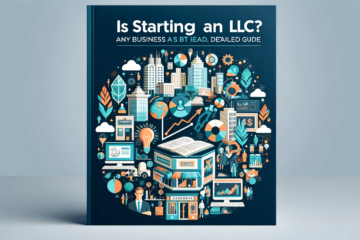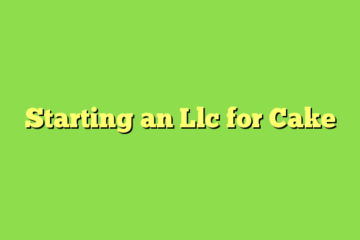Limited Liability Companies (LLCs) face unique opportunities and challenges in selecting and securing optimal funding sources. Unlike corporations, which commonly rely on stock issuance, LLCs benefit from exploring a wider variety of financing methods tailored to their specific business models and growth needs. Thus, effective funding strategies are critical for sustaining early growth and securing a position for long-term success. This guide provides an in-depth examination of core funding options, detailing how LLCs can make informed decisions about financing.
Evaluating Capital Needs and Growth Timing
Assessing capital requirements precisely is crucial for effective funding; start-up costs, operational expenses, and growth needs contribute to this analysis, enabling entrepreneurs to define exact funding needs. Meanwhile, organizing costs into categories like product development, staffing, marketing, and inventory clarifies resource requirements. Timing plays a critical role; securing funds too early may lead to unnecessary debt, while delays risk cash flow disruption. Thus, strategically timing capital infusions at growth stages aligns resources with operational demands. When managing operational costs, LLC entrepreneurs can benefit from exploring services like Utility Bidder to compare energy tariffs and make informed decisions for their businesses.
Bootstrapping and Self-Financing as Flexible Options
Bootstrapping—or self-financing—is a common LLC funding approach, relying on personal savings, reinvested profits, or support from friends and family. It allows entrepreneurs to retain ownership and avoid debt, promoting financial discipline as expenses are closely scrutinized. Though limited resources may restrict scalability, bootstrapping supports early growth and initial momentum. This strategy can also complement later funding stages, especially for LLCs targeting more ambitious growth.
Small Business Loans and Lines of Credit
As we approach 2025, small business funding and lines of credit provide viable funding for LLCs needing moderate capital without ownership dilution. Banks, credit unions, and government-backed programs like the SBA offer structured funding at competitive interest rates, especially for strong credit histories.

Meanwhile, lines of credit add flexibility, providing funds as needed. These pathways support cash flow stability and growth with manageable repayment terms based on company health. In this context, reviewing terms, interest rates, and lender requirements aligns loans with cash flow and growth goals.
Venture Capital and Angel Investment for High-Growth LLCs
LLCs primed for rapid expansion often seek venture capital (VC) or angel investors, which bring significant funding and strategic expertise. VCs invest in high-growth businesses expecting strong equity returns, while angel investors tend to focus on early stages, sometimes in exchange for convertible debt or equity. Beyond capital, these investors contribute mentorship and network connections; however, VC or angel investment may require restructuring as a C Corporation, which fits investor preferences for equity returns. One caveat: considering ownership dilution and potential external influence is essential when evaluating this path.
Crowdfunding as a Market-Tested Funding Option
Crowdfunding offers LLCs access to a broad support base, which is particularly effective for consumer-focused products. Platforms like Kickstarter, Indiegogo, and GoFundMe enable direct public engagement, allowing funds to be raised while gauging market interest. Reward-based crowdfunding, offering products or incentives rather than equity, provides LLCs with a debt-free, non-dilutive funding method.

Successful campaigns can also build a customer base pre-launch, providing feedback for refinement. Campaign outcomes depend on a compelling pitch and offerings, with success influenced by platform reach and campaign strategy.
Government Grants and Incentive Programs
Government grants and incentives offer non-dilutive funding that is well-suited to LLCs in sectors like technology, education, and renewable energy. Grants from government agencies and nonprofits support expenses like R&D, operational costs, and expansions without requiring repayment. While valuable, these funds often involve detailed applications and eligibility criteria. Grants frequently require specific documentation and compliance, rendering them suitable for LLCs prepared for rigorous application processes. For eligible LLCs, government grants enhance business capabilities without incurring debt.
Forming Strategic Partnerships and Joint Ventures
Strategic partnerships and joint ventures provide funding alternatives by leveraging collaboration without incurring debt or equity dilution. Partnering with complementary businesses grants LLCs additional resources, market reach, and expertise. In this context, partnerships can involve co-marketing, revenue sharing, or product co-development, benefiting each party. Ultimately, joint ventures reduce financial burdens while enhancing capabilities, making them ideal for growth with minimal capital; however, careful evaluation of partners’ goals, values, and market position strengthens alignment and the partnership’s strategic value.
Convertible Debt as a Flexible Funding Solution
Convertible debt—which combines elements of debt and equity—offers LLCs a flexible financing option. This approach involves borrowing capital with an option for investors to convert debt into equity at a later stage, typically at a discount. For LLCs anticipating significant growth, convertible debt provides an immediate capital boost without immediate ownership dilution. Convertible debt is often used during early-stage funding, deferring equity-based valuation negotiations until the business has achieved a stronger financial footing. Ultimately, careful planning around debt obligations and conversion terms optimizes convertible debt as an instrument to balance funding needs with ownership considerations.

Aisha Noreen is an owner of a small business with more than 9 years of experience in the marketing industry. With the wisdom of an old soul, she always seeks innovation and mind-blowing ROI techniques. Her unique approach helped many small businesses thrive and she can surprise you in many ways as well. Believe it or not, her energy, passion, and creativity are contagious enough to transform your business and take it to another level.









